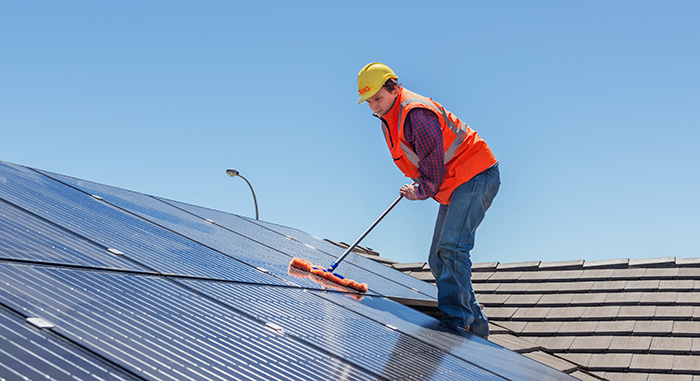Module cleaning is an issue that many people disregard. Most individuals are unaware of the need of cleaning components on a regular basis in order to optimise the system's power generation efficiency, as well as key aspects to consider when cleaning components. Today, the PV module cleaning concerns are summarised.

Module cleaning is an issue that many people disregard. Most individuals are unaware of the need of cleaning components on a regular basis in order to optimise the system's power generation efficiency, as well as key aspects to consider when cleaning components. Today, the challenges surrounding PV module cleaning are summarised. The following are the issues that require attention when cleaning PV modules.
1. To prevent wiping components at high temperatures and exposing them to strong light, which can cause personal electric shock harm and component damage, staff often prefer to clean components in the mornings or late afternoons.
2. Before cleaning the components, we should examine the monitoring record for any abnormal power output records, determine whether they are caused by power leakage, and check for any damage or adhesion to the connecting wires and related components of the components, as well as test the aluminium frame, bracket, and tempered glass surface of the components with a test pen. In order to eliminate the hidden hazard of power leaking and protect personal safety.
3. The aluminium frame of the PV module and mount has numerous sharp angles. To avoid scratching and harming themselves, people cleaning the modules should wear appropriate working attire and caps. Hooks and straps should not be used on clothing or tools. Tripping hazards include wires and other components.
4. Stepping on PV modules, rail brackets, cable bridges, and other photovoltaic system equipment, as well as attempting to assist with component panels and brackets, is strictly banned.
5. Cleaning the PV module is strictly banned under meteorological conditions of high wind, heavy rain, thunderstorm, or heavy snow. Rinsing should be avoided during winter cleaning to avoid low temperatures and icing, which can lead to filth buildup; similarly, do not rinse with cold water while the panel is hot.
6. Strictly prohibit the use of hard and sharp instruments, corrosive solvents, and alkaline organic solvents to clean the PV module, as well as the spraying of cleaning water on the component junction box, cable tray, convergence box, and other equipment. Cleaning cleaning equipment on the component impact pressure must be managed within a specified range, in order to avoid the force created by hidden cracks.
7. Cleaning professionals are not permitted to stand on the edge of the roof less than one metre from the location of operation. It is not permitted to throw tools and sundries downhill; instead, they must be removed after the procedure is completed.
Finally, users should not clean themselves unless they have a thorough understanding of the appropriate professional cleaning procedures. It is best to have professional PV cleaning personnel clean and overhaul the system to ensure that no photovoltaic components are damaged during the cleaning process.







